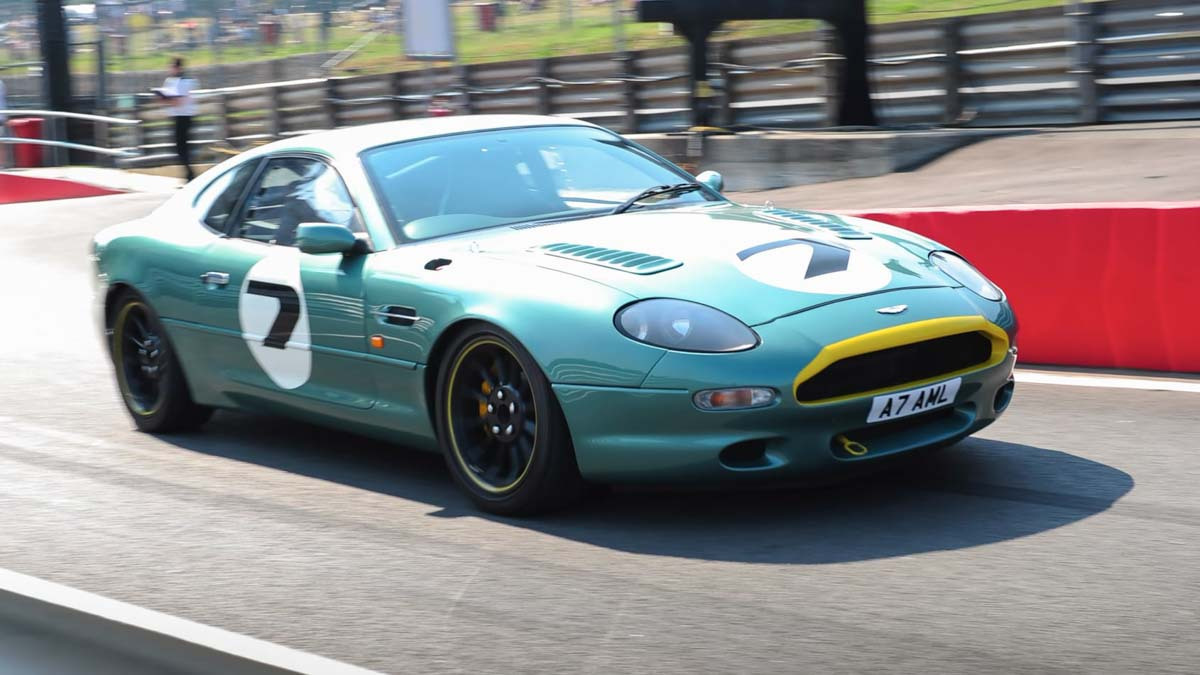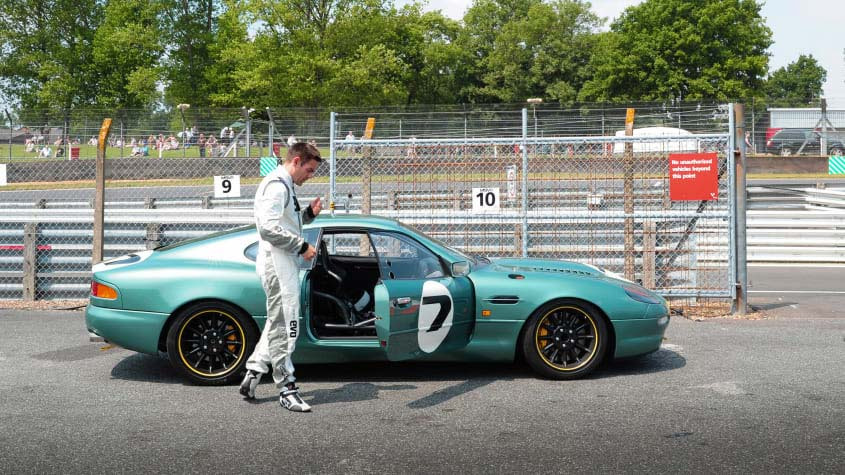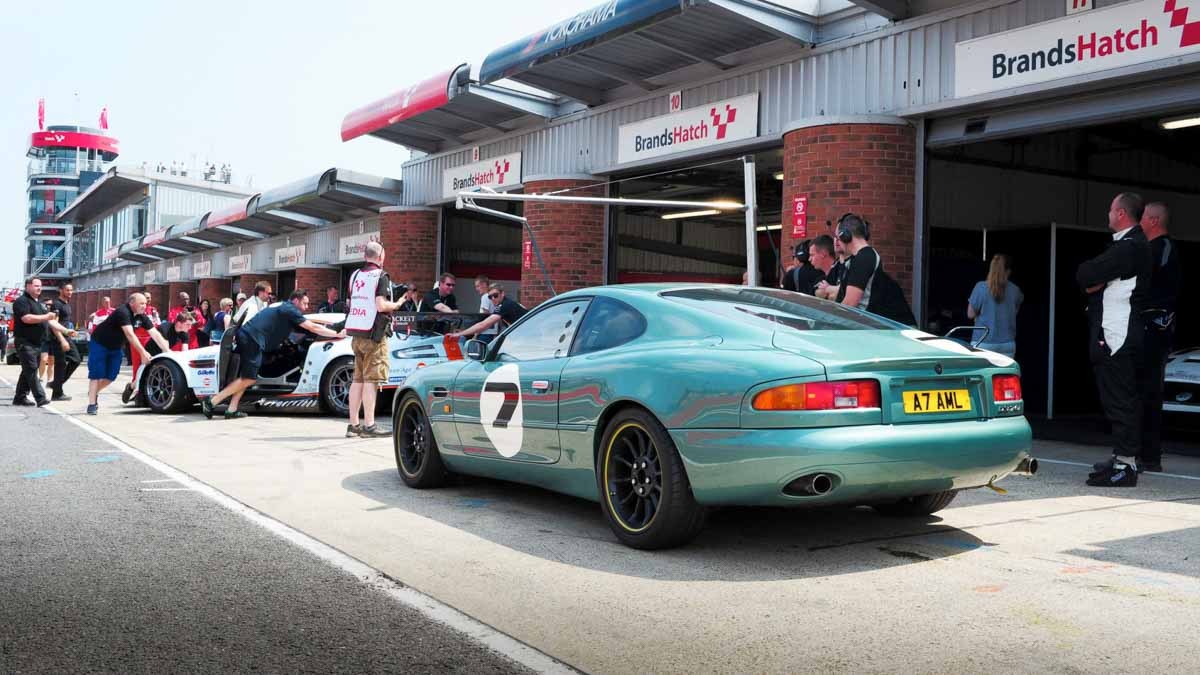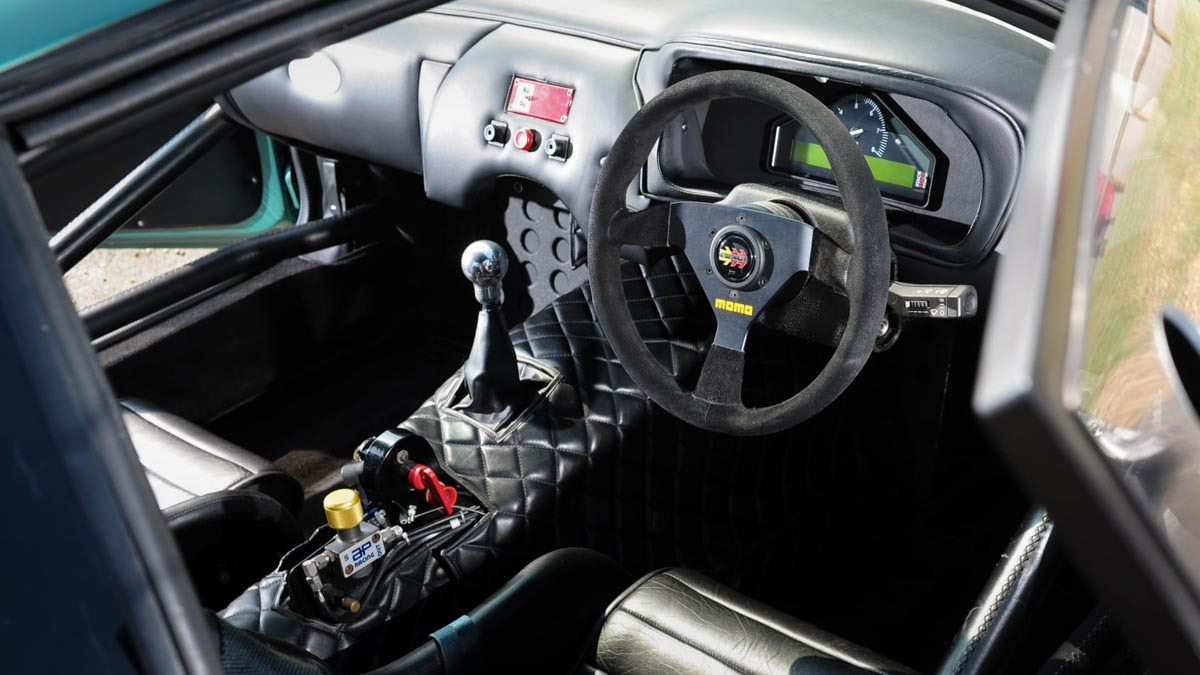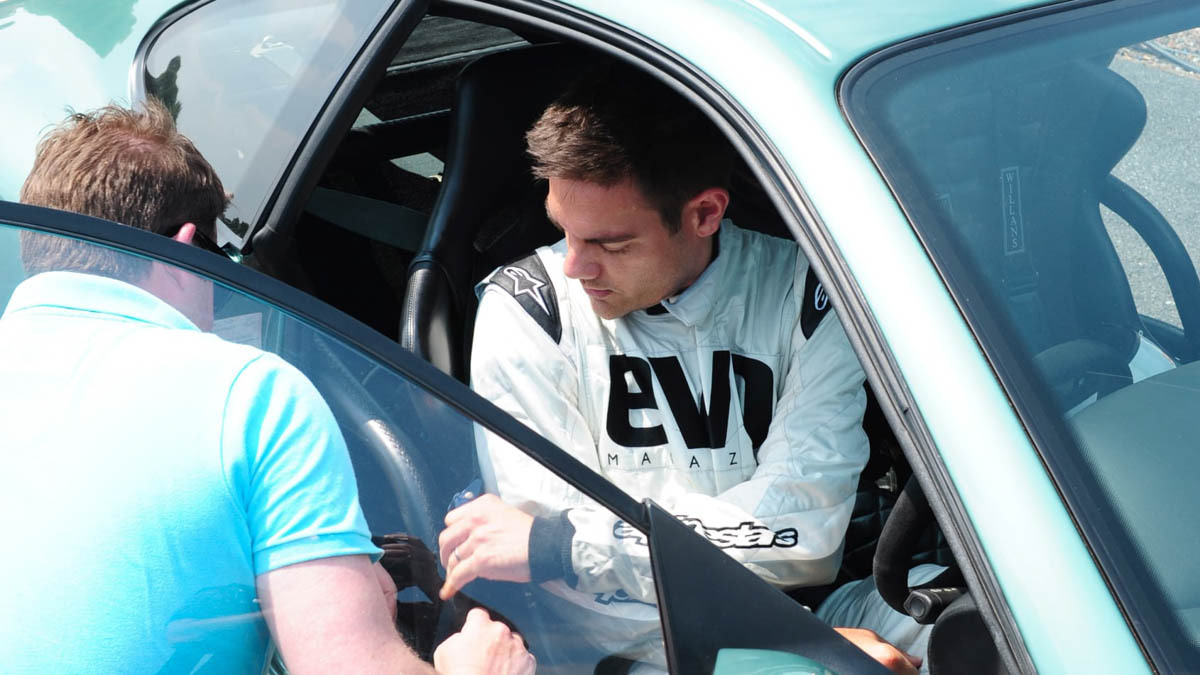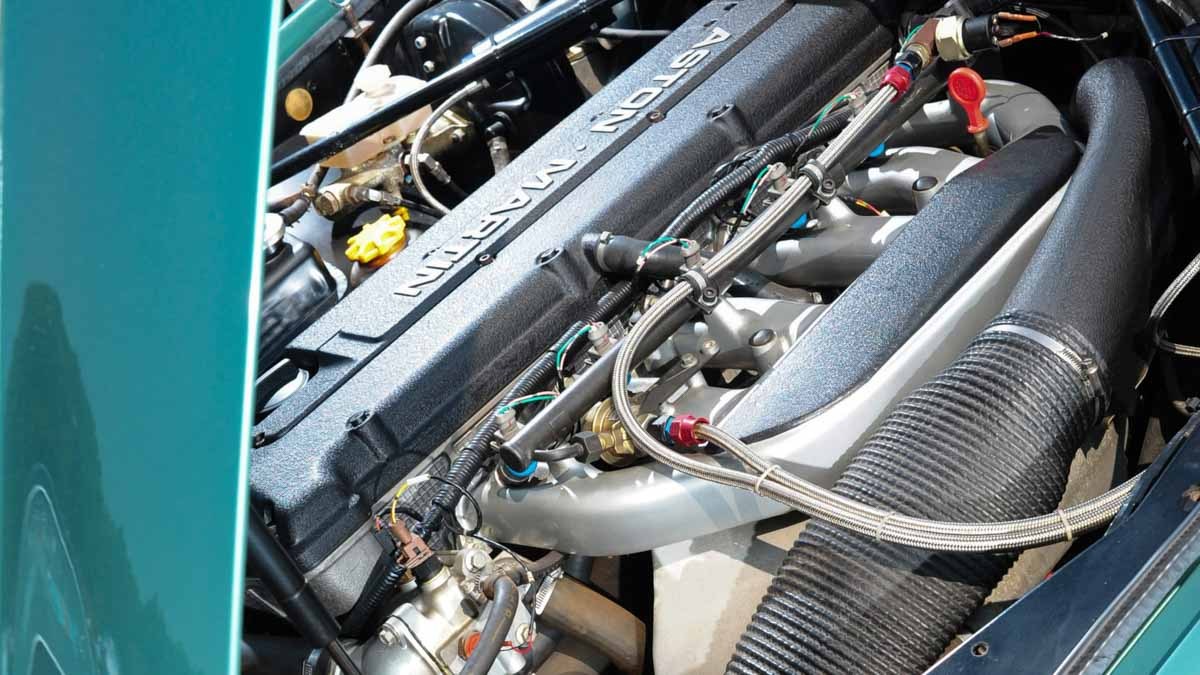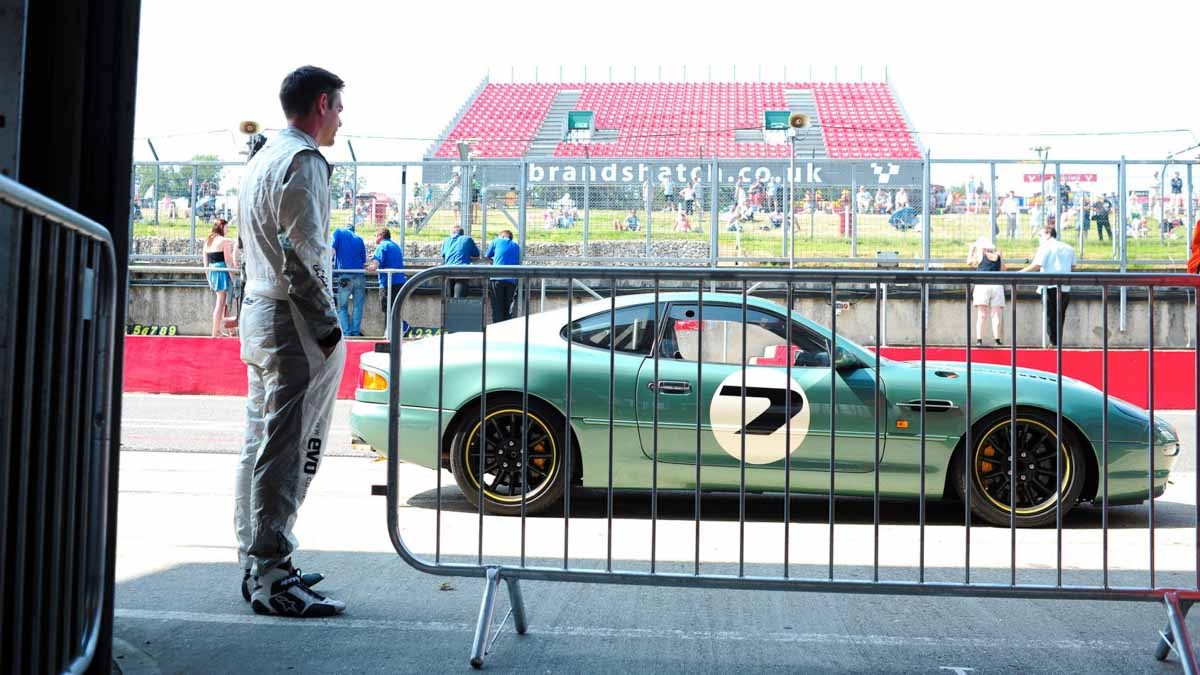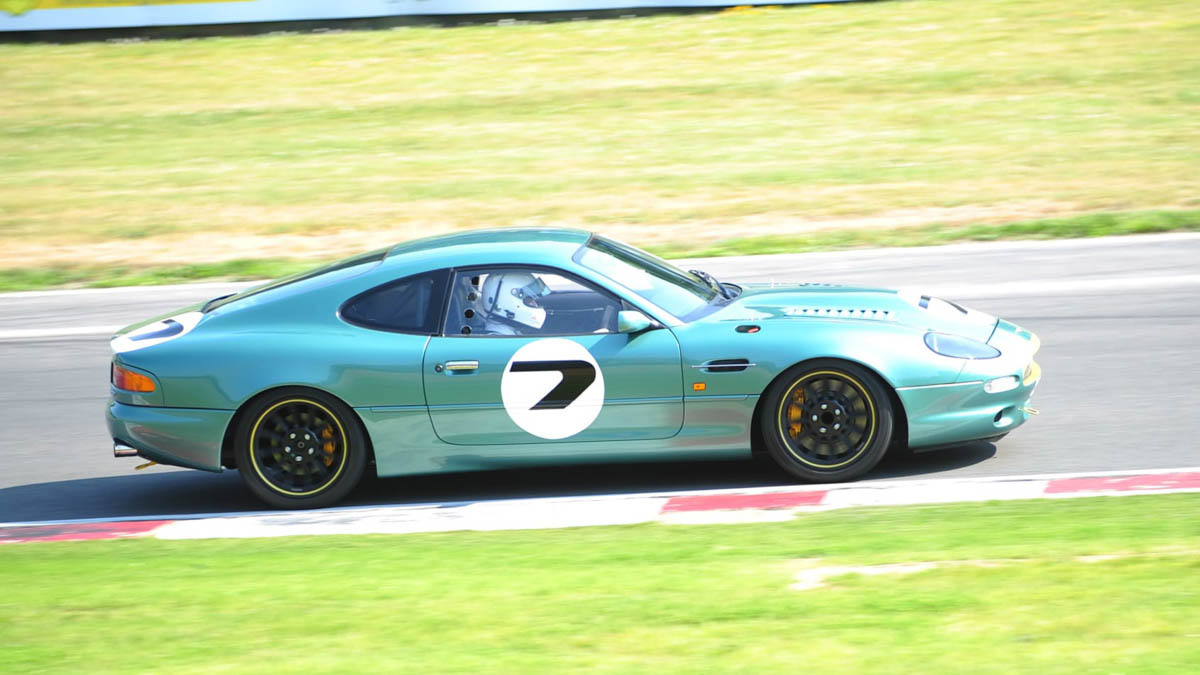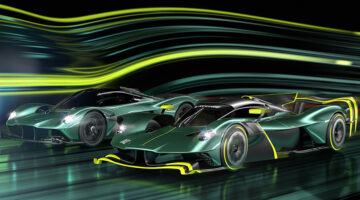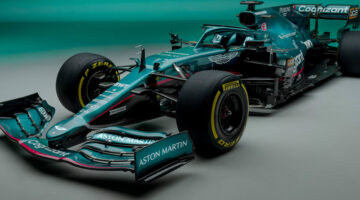This DB7 was the prototype for a race series that never happened. We head to Brands Hatch to get behind the wheel
Never has such an extraordinary sight graced the rear view mirror of any car. Dead ahead is the pit-lane exit at Brands Hatch and for the next 15 minutes or so the full glorious GP circuit will be shared between just five cars. The grandstands and the sun-scorched grass banking are thronged with Aston fans. Even for a spoilt motoring journalist this feels pretty special. But forget that empty former F1 circuit for just a second, for it’s the reflected magnificence when I glance up that is truly mind-blowing: the tiny domed roofs of two Group C racers; towering above them the pastel blue and orange colours of Gulf, draped over a current Le Mans racer, and, to the left, a sliver of almond green aluminium teased over wire wheels… Even my scrambled brain computes instantly: AMR1, Nimrod, Vantage GTE, DB4GT Zagato. And me. In – of all things – a DB7. What the hell is going on?
Well, this is the Aston Martin Centenary Meeting – an event packed with Aston racing, fantastic displays, a jubilant and relaxed atmosphere and some of the most mouth-watering cars from 100 years of passion, pain and glory. And ‘my’ DB7 is no ordinary DB7. Chassis number SCFAA1114RK10006 was developed by Aston Martin and Prodrive, along with a sister car that was later heavily crashed, to investigate the potential of a one-make DB7 race series back in 1995. Despite media attention and real interest amongst gentleman racers it didn’t quite stack up as a business proposition and sadly came to nothing. So this DB7 GT Prototype 001 is now a unique piece of history. And as an official Aston Martin prototype racing car it has been deemed fit to share the same stretch of tarmac as some of Aston’s most celebrated competition machines for a handful of demonstrations laps. Quite why I’ve been deemed fit to drive it is another matter… but sharing a track with Bruno Senna, who’s in the Vantage GTE, is pretty darn cool so I’m not complaining.
> One-of-one Aston Martin Victor revealed – 836bhp Vulcan-based retrospective
The Centenary Meeting is a fantastic reminder of Aston Martin’s roots in motorsport and perhaps illustrates why there was an appetite to give the DB7 some racing pedigree. Under Ford’s ownership, Aston was coming out of a long period of instability littered with relatively unsuccessful and often prematurely aborted motorsport programmes. With new investment, a new factory and a new impetus it seemed obvious to take the new DB7 to the racetrack. However, rather than a high-profile and expensive assault on something like the GT2 category that was running at Le Mans at the time, a more lightly modified one-make racer seemed a more realistic target. The DB7 GT programme was born…
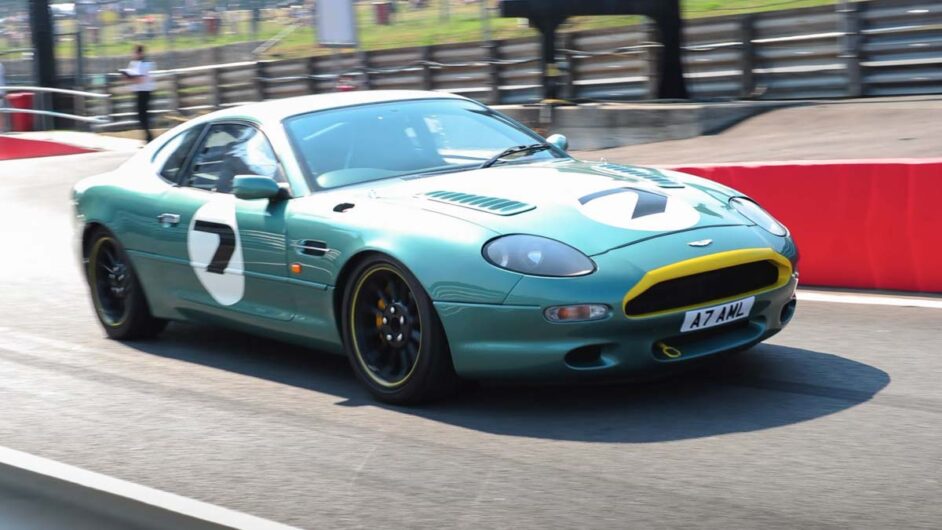
An agreement between Aston MD Nick Fry and Prodrive’s David Richards was signed on May 15, 1995 to develop one prototype DB7 GT racecar in time for the Coys Historic Festival on July 29 and later to assist Aston Martin in producing a limited number of road versions. Prodrive assigned two engineers, one draughtsman and two technicians to the project and set to work. Soon afterwards Aston scrapped the idea for the road car and instead decided to build a second DB7 GT to the same specification as the Prodrive car but prepared and trimmed at Newport Pagnell – it was christened the ‘Gentleman’s Racer’ and would benefit from such niceties as leather, Alcantara and quilted vinyl trim.
A standard DB7 was taken off the press fleet, the interior was stripped out and the car sent to Safety Devices for a full roll-cage to be installed. When it returned it was fitted with two Recaros (carefully chosen to accommodate ‘a wide range of drivers’. In other words ‘wide drivers’), and prepared for the track. To reduce weight, aluminium bonnet, wings and boot lid were fitted. Using the original drawings, aluminium versions of the radiator, intercooler and oil coolers were also fabricated, as well as an aluminium fuel cell to be located in the boot. The DB7 GT would forgo wings and venturis, but as a concession to aerodynamics the door mirrors were repositioned on the cheater panel of the (now Perspex) window frame. Then in went a fresh 3.2-litre supercharged straight-six and a shot-peened five-speed gearbox with a lower 3.77 final drive, along with the heavily modified front and rear suspension assemblies designed and produced by Prodrive. The DB7 GT would also benefit from a freer-flowing exhaust system, AP Racing brakes and dampers by Bilstein.
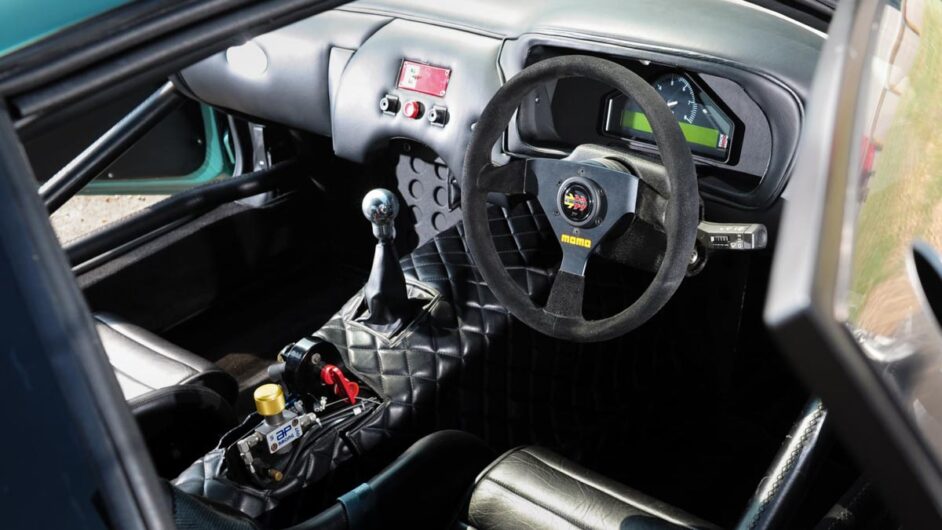
Such were the timescales that the development programme was intense and actual testing was limited to around 644 kilometers. However, Prodrive was thorough and lent on the expertise of sportscar racing legend Andy Wallace, who appraised the GT at Millbrook and Pembrey. The aim was to produce a predictable and progressive car that could be handled by novices but still reward the more skilled. Later the two prototypes would be demonstrated at Goodwood to AMOC racers and the press. Stirling Moss was the man at the wheel of this very car that day in West Sussex.
So that’s Bruno Senna behind, and there’s the pair of Group C racers, and this seat has hosted Stirling Moss and Le Mans winner Andy Wallace. To say I’m happy for my own selfish purposes is an understatement, but I’m also a bit sad for the Aston fans hoping to see some full-blooded demo laps. This ‘Gentleman’s Racer’ was up for sale at $201,000 by Nicholas Mee & Co, it’s unique and, erm, I’m never driven the full Brands GP circuit, which climbs out into the woods and is apparently very scary indeed. Did I mention that the DB7 GT is on narrow 245-section road tyres? Do you think anybody would mind if I just turned right at the end of the pit-lane and quietly disappeared into the bustling paddock area?
A marshall in orange overalls points sternly at the DB7 GT, then smiles and spins his index finger in the air – the universal sign in motorsport that means start your engine and get the hell out of here. So I do. The paddle-clutch is grabby but the 3.2-litre supercharged straight-six has plenty of torque and doesn’t so much as hiccough as I roll past the marshall and then climb up onto the top of Paddock Hill Bend. The five-speed ’box is pretty light and wholly intuitive and the AP Racing brakes feel strong but don’t have the usual racecar deadness when you just feather them. So far, it all feels pretty friendly and you can sense this is a modified road car rather than an out-and-out racer.
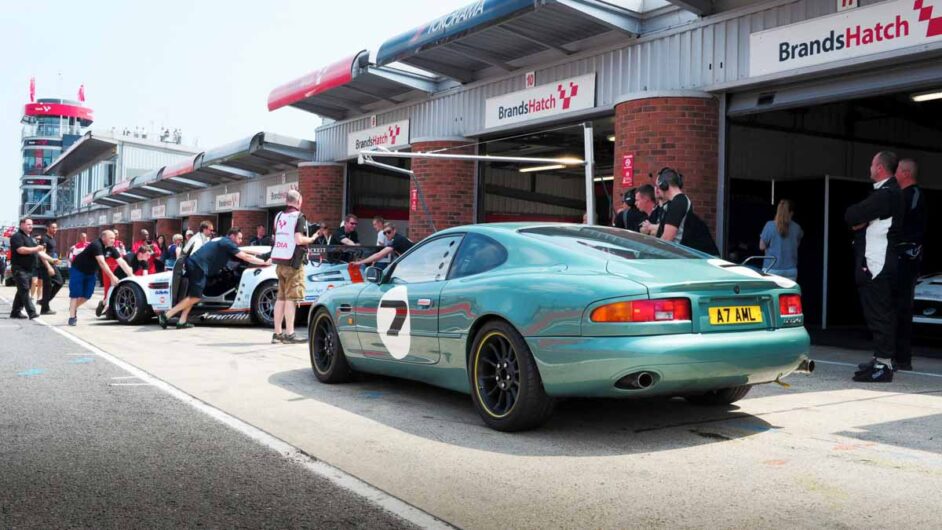
At Druids hairpin the AMR1 and GTE still haven’t got me… I think they’re pootling for the cameras. Here the DB7 displays a bit more of its potential. It turns in quickly and totally flat and the long bonnet stays on line even with plenty of throttle and the scream of the supercharger starting to penetrate my Arai. Right at the exit the rear Bridgestone S01s – hopelessly skinny by today’s standards – spin-up and the car skips sideways a little. The large castor angle makes it difficult to judge the correction and it’s hard work to take off the opposite lock quickly enough as the car straightens. Yep, this isn’t like any other DB7 I’ve driven. I think it’s about now that I start to smile…
At Graham Hill Bend, the GTE and AMR1 are on me. God, the noise as the GTE dives down the inside, trailed by the seemingly sill-high Group C car, is just out of this world. The AMR1’s motor has that deep, angry V8 noise and it thuds through the DB7’s aluminium skin and into my bones.
Andy Wallace: DB7 GT test pilot
Back in 1995, Andy Wallace’s day (and night) job was driving the iconic Harrods-sponsored McLaren F1 GTR for David Price Racing. The McLaren was a tricky beast to hustle, but along with team-mates Derek and Justin Bell he’d score a podium finish in the car at Le Mans – another great day in a glittering career. However, the life of a race driver isn’t all glamour, and the first time he tested the DB7 GT it was a million miles from spraying champagne at Le Mans. ‘It was a grey day – thick fog and poor visibility,’ he recalls. ‘I guess that would normally be OK but we flew to Pembrey from Prodrive in Banbury in David Richards’ helicopter… It was so foggy that we had to keep dipping down to read road signs to make sure we were going the right way.’
They made it to Pembrey and Wallace liked what he found. ‘Of course, jumping out of a GT1 car, the drop in performance was pretty huge.’ He’s not joking; the GTR had over 600bhp and was clocked at 380kph on the Mulsanne. ‘But they were considering a one-make series and the car felt pretty good right from the start in those terms.’
Gentleman drivers tend to have a wide spread of ability and so the DB7 needed to suit all styles and all talents. ‘My job was to make the car as friendly and stable as possible,’ says Wallace. ‘As I recall, that really just involved relatively minor suspension setting tweaks. We had Pembrey to ourselves and actually it was great fun. The car had real potential.’
The GTE’s V12 is sharper, a real ear-ringer. It feels like I’m trapped inside some sort of fantasy Le Mans game. Sadly it’s over in a couple of milliseconds, the cars disappearing into the shimmering heat-haze with a crack of ignition cut and a sweet smell of race fuel hanging in their wake. They’ll be back around again soon, I reckon. In the meantime it’s just me and Brands and this one-off DB7 GT.
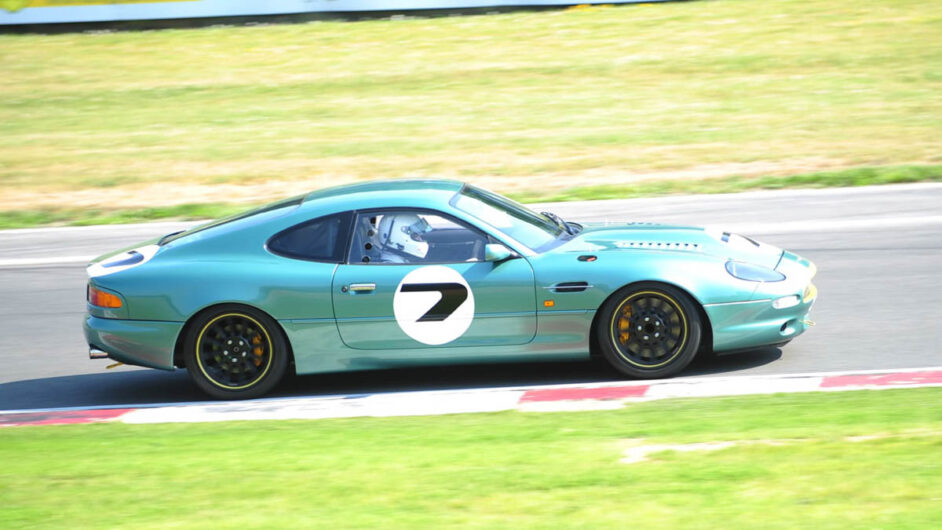
It takes maybe half a lap to reveal that the DB7 is an inherently friendly car to hustle. To be honest the combination of race dampers and road tyres doesn’t quite work – they simply can’t deliver the load asked by the responsive, agile set-up. Go in too hard and the front snaps onto line initially but then grip bleeds away quite quickly at the front. You sense that on slicks it’d hang on much more faithfully and you could start to tweak the balance more with the throttle. Take a slow-in/fast-out approach and the DB7 is a natural oversteerer and feels beautifully progressive once you get used to the lack of self-centring in the steering. However, it’s on the final Clark Curve that I really get a taste of what might have been…
The negatively cambered right-hander drops away from you into a compression, before the camber switches and gives you something to lean into for the fast run onto the undulating Brabham Straight. Tip the DB7 in and there’s a tiny push of understeer but it almost instantly stabilises and, as the rear tyres fall off the camber behind, they slide, too. Now the car is in a delicious four-wheel drift and seems to gently see-saw over the limit as you fall down into that compression. At the bottom it grips and then fires out onto the straight, engine buzzing around to the limiter, the DB7 hooked-up and really feeling every inch the racecar. With another 15 of these buzzing around it could have been terrific fun and a real spectacle.
The next few laps go in a blur, the cabin getting fearfully hot on the toastiest day of the year; the tyres are feeling the heat too and gradually more understeer is creeping in as the AMR1 and GTE spear down the inside into Druids one more time. What an astonishing experience. The DB7 GT of course doesn’t have the potential of, say, a modern Vantage GT4 car, nor the majesty of some of the old DB4 racers. Even so, it’s great fun and a testament to the guys who developed the concept and executed it so expertly. I’m not sure many people were too desperate to see me trundling around Brands Hatch while 1 VEV and AMR1 were circulating at the same time, but I wouldn’t have missed it for the world.
DB7 GT prototype
| Engine | In-line 6-cyl, 3228cc, supercharged |
| Max power | c350bhp |
| Max torque | n/a |
| Transmission | Five-speed manual, rear-wheel drive, limited-slip diff |
| Steering | Rack and pinion, power-assisted |
| Brakes | AP Racing |
| Tyres | 245/40 ZR18 Bridgestone S01 |
| Weight | c1600kg |
| Power to weight | c220bhp/ton |
| 0-100kph | 5.5sec (est) |
| Top speed | 157kph (est) |
| Price new | n/a |
| Value today | c$201,000 |
This article originally appeared at evo.co.uk
Copyright © evo UK, Dennis Publishing

